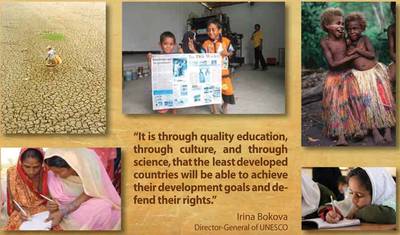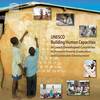Least Developed Countries
The United Nations recognizes the Least Developed Countries (LDCs) as the “poorest and weakest segment” of the international community. They are considered highly disadvantaged in their development process and risk, more than other countries, not being able to rise out of poverty. This is why is the LDCs must receive targeted support from the international community. There are currently 48 Least Developed Countries, as classified by the United Nations.
UNESCO is committed to providing targeted assistance to the LDCs in all of its spheres of competence, as reflected in its Medium-Term Strategy for 2008-2013 (34 C/4). It is working to reduce inequalities and to reach the marginalized and the most vulnerable communities by further focusing its action in favour of the least developed countries (LDCs) in its Programme and Budget for 2012-2013 (36 C/5), guided especially by the Programme of Action for the Least Developed Countries for the Decade 2011-2020 (http://ldc4istanbul.org/uploads/IPoA.pdf ) that was adopted at the Fourth United Nations Conference on the Least Developed Countries (Istanbul, May 2011).
Targeted action for the LDCs during the 2012-2013 programme cycle focuses on promoting quality education in 38 targeted LDCs to support learners, in particular women, to acquire the skills and knowledge needed to develop professional careers and to enter the world of work in the following priority areas:
- Literacy
- Technical and Vocational Education and Training (TVET)
- Teachers
- Education Sector-Wide Planning
- Working to reduce female drop-out rates in the transition from primary to secondary education and to support women’s literacy programmes in Africa and Asia through its recently launched Global Partnership for Girls’ and Women’s Education
- Providing policy advice and capacity-building in Science, Technology and Innovation for sustainable development and poverty reduction.
- Promoting the sustainable management of freshwater, ocean and terrestrial resources, including renewable sources of energy, as well as disaster preparedness and mitigation .
- Promoting culture as a powerful engine for economic growth to generate income and stimulate employment.
- Developing free, pluralistic and independent media, training journalists and media professionals and fostering ICT applications for enhancing quality and impact of teaching and learning processes, notably through its International Programme for the Development of Communication (IPDC) , and with a special focus on youth and women.
- Promoting youth-led social entrepreneurship in Africa, supporting youth led community projects, and enabling youth to share their experiences. Sport, culture and non-formal education are being leveraged as key entry points to support youth in political and social processes.
To find our more about what UNESCO is doing to assist the least development countries in achieving their development objectives, click here.


